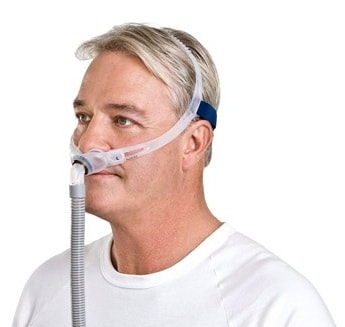Sleep Apnea Masks - The Importance of Correct Type and Fit
One of the most important components of a Continuous Positive Airway Pressure (CPAP) Therapy is a proper fitting and comfortable Sleep Apnea Mask. In fact, most sleep apnea professionals believe that the biggest part of CPAP Therapy compliance hinges on sleep apnea masks that deliver a snug fit and air pressures that are easily tolerated by their users. CPAP Therapy statistics show that only 60% of its patients are compliant with the therapy after 60 days. However, if used correctly, the results of using a CPAP machine and sleep apnea mask can eliminate the apnea episodes entirely.
So, why wouldn’t a patient want to stay compliant with the therapy? The answer in almost all of the cases is an uncomfortable mask or too much pressure from the CPAP device. So, if you are going to receive CPAP therapy, you need to do your homework and get the best mask possible and insure that your air pressures are properly titrated.

Most sleep apnea masks are triangular in shape, cover either your nose, mouth, or both, and deliver pressurized air from the CPAP Machine via tubing to which it is attached. It is this pressurized air that ultimately “opens up” your obstructed or blocked airway. Sleep apnea masks are typically attached to your head by straps or head gear, the purpose of which is to hold the mask in place so that no leaking occurs. In the event leaking does occur, the effectiveness of the CPAP equipment therapy is impaired because you will not be getting an ample amount of air pressure to cure the airway obstruction.
It is important to note that most CPAP machines are designed to compensate for leaks by using internal sensors to make adjustments when airway pressures are reduced. However, you need to be cognitive of excessive leaking which is not normal. Be on the watch for a mask that might be too large because they will leak more easily than one with a tight fit. Remember, a good rule of thumb is to always choose a mask that is snug or smaller.
The majority of sleep apnea masks are made out of silicone plastic that seals softly to your face. There are numerous choices in mask type depending on your situation. For example, there are masks made for “mouth breathers”, or for folks who have facial hair, and those that breathe only out of their nose. Some masks even accommodate glasses!
A good home medical equipment provider should be able to show you a wide variety of sleep apnea masks. Be picky, there are a lot of good choices, make sure you try several before you make a long term decision. Additionally, if you are allergic to silicone, there are masks made from materials like synthetic Gel, Vinyl, or Rubber.
Instead of the traditional triangular mask, there is another option that uses the name mask, but, really is not one. Nasal Pillows are inserted into the nostrils by two small flexible pieces of soft plastic which is attached to the tubing. Nasal Pillows are in essence a like a small mask, but, really do not cover anything. In fact, most people with a moustache or beard simply use nasal pillows instead of a mask.
It is also important to note that dry skin can negatively impact you an apnea mask’s ability to seal properly. It is advised to use non-petroleum based skin moisturizers before putting on your mask which can help eliminate this problem. In contrast, excess skin oil can also reduce the effectiveness of the seal between the face and the mask.
Don’t worry if your apnea mask of choice is manufactured by one company and the CPAP equipment is made by another. Most apnea masks are made to attach to the standard CPAP air hose. So, when it comes to choosing the right apnea mask, make sure you only go with one that is comfortable and delivers the fit you desire. After all, if the fit is not right, you could be up all night. More read :SoClean CPAP Cleaner Reviews
Comments